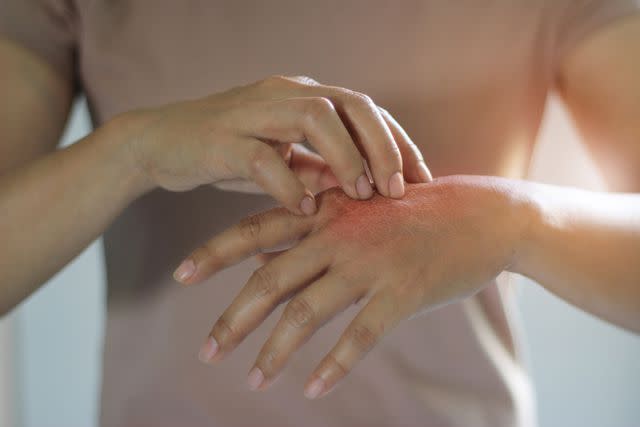What Are IL-17 Inhibitors?
Interleukin (IL)-17 inhibitors treat psoriasis by reducing inflammation.
Medically reviewed by Leah Ansell, MD
Interleukin (IL)-17A is a pro-inflammatory cytokine (proteins that serve as messengers between cells) that plays a role in skin disorders such as psoriasis (PsO) and autoimmune diseases like psoriatic arthritis (PsA). IL-17 inhibitors block this cytokine’s inflammatory pathways and are used to treat psoriasis and psoriatic arthritis. IL-17 inhibitors belong to a family of biologic drugs called monoclonal antibodies that target the interleukin-17A receptor.
This article explains how IL-17 inhibitors work, what they treat, and weighs the benefits and risks of taking these immunosuppressive biologic medications.

ipopba / Getty Images
How IL-17 Inhibitors Work
All of these IL-17 inhibitors work in a similar way; they target the IL-17A receptor, which blocks the inflammatory pathway of this cytokine. Blocking IL-17A's inflammatory pathway improves psoriasis symptoms and helps reduce inflammation caused by other autoimmune diseases.
In addition to targeting IL-17A, researchers are also looking at how inhibitors work downstream to affect interleukin-23, which stimulates IL-17 production by activating Th17 cells. The IL-23/IL-17 axis is a key area of focus for targeted therapies used to treat chronic inflammatory diseases.
What IL-17 Inhibitors Treat
Healthy amounts of pro-inflammatory cytokines protect and heal tissue inflammation. However, too much IL-17 contributes to the development of psoriasis. Psoriasis is a chronic skin condition caused by excessive secretion of pro-inflammatory cytokines such as interleukin-17A.
Although the exact cause of psoriatic arthritis is unknown, 85% of people with psoriatic arthritis also have psoriasis.Both of these inflammatory diseases are treated with IL-17 inhibitors, which tame pro-inflammatory cytokines. Cosentyx (Secukinumab), Taltz (Ixekizumab), and Siliq (Brodalumab) are all IL-17-inhibiting psoriasis medications approved by the FDA to treat psoriasis and psoriatic arthritis.
IL-17 inhibitors are also used to treat ankylosing spondylitis (AS), which is a type of inflammatory arthritis that primarily affects the spine.
Types of IL-17 Inhibitors
IL-17 inhibitors are a type of drug called biologics that are self-administered by subcutaneous injection applied with a needle under the skin.
Bimzelx (bimekizumab), Cosentyx (Secukinumab), Taltz (Ixekizumab), and Siliq (Brodalumab) are similar types of drugs, but they each have slightly different dosages. Be sure to ask your pharmacist or a healthcare provider about the specific dosing schedule for the type of IL-17 inhibitor you're prescribed.
These IL-17 Inhibitors Are FDA Approved
Four IL-17 inhibitors—Bimzelx (bimekizumab), Cosentyx (secukinumab), Taltz (ixekizumab), and Siliq (brodalumab)—are FDA-approved for the treatment of plaque psoriasis and psoriatic arthritis.
Benefits and Risks
IL-17 inhibitors are one of the most effective biologic medications for the treatment of moderate-to-severe plaque psoriasis. In 2020, a meta-analysis of the cumulative clinical benefits of IL-17 inhibitors for the treatment of psoriasis over 16 weeks found that these biologics work much better than other medications.
Numerous studies have established that IL-17 inhibitors are generally well-tolerated, safe, and provide significant benefits for people with psoriasis, psoriatic arthritis, and ankylosing spondylitis.
However, these biologic medications are not without risks. Most notably, IL-17 inhibitors are immunosuppressants. They tone down the immune system, which increases the risk of serious infections. Immunosuppressive therapies also weaken the immune system's ability to detect and destroy cancer cells or fight the infections that cause cancer.
Because of the immunosuppressive effects of IL-17 inhibitors, it's important to speak with a healthcare provider about what precautions you can take (e.g., getting vaccines before starting treatment) to minimize the risks associated with these biologics.
Summary
IL-17 inhibitors block the inflammatory pathway of interleukin-17A. These biologic medications are an extremely effective FDA-approved treatment option for people with psoriasis and psoriatic arthritis. These drugs, which are self-administered via subcutaneous injection, are also approved for the treatment of ankylosing spondylitis and axial spondyloarthritis. Although IL-17 inhibitors have significant benefits, they also have immunosuppressive effects, which can increase the risk of serious infections and other adverse reactions.
A Word From Verywell
Since IL-17 inhibitors were first approved by the FDA in 2015, they've radically improved quality of life for people living with psoriasis and psoriatic arthritis. These monoclonal antibodies are a game-changer. That said, these biologics are immunosuppressive and tamp down the immune system, which increases your risk of infection and certain types of cancer. When taking IL-17 inhibitors, always stay in close communication with a healthcare provider to monitor and fine-tune your treatment plan to optimize benefits while minimizing risks.
Frequently Asked Questions
What's the difference between Cosentyx, Taltz, and Siliq?
Cosentyx (secukinumab), Taltz (ixekizumab), and Siliq (brodalumab) are three very similar IL-17 inhibitors that work by blocking the inflammatory pathway of interleukin-17A. These biologic drugs are all FDA-approved for the treatment of psoriasis and psoriatic arthritis. Cosentyx and Taltz are also used to treat a form of inflammatory arthritis called ankylosing spondylitis.
What causes psoriasis and how do you treat it?
Psoriasis (PsO) and psoriatic arthritis (PsA) are chronic autoimmune disorders. Researchers believe that PsO and PsA are caused by an overactive immune system, which triggers the release of too many pro-inflammatory cytokines like interleukin-17A. IL-17 inhibitors target IL-17A's inflammatory pathways and are used to treat psoriatic disease.
Do IL-17 inhibitors suppress the immune system?
IL-17 inhibitors are immunosuppressive therapies that suppress the immune system's ability to make excessive pro-inflammatory cytokines. Although tamping down the immune system with these medications reduces inflammation and dramatically helps people with psoriatic disease, immunosuppression increases the risk of infection and can have other adverse effects.
Read the original article on Verywell Health.

